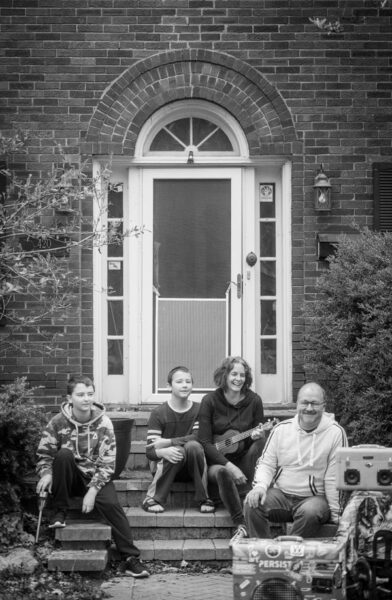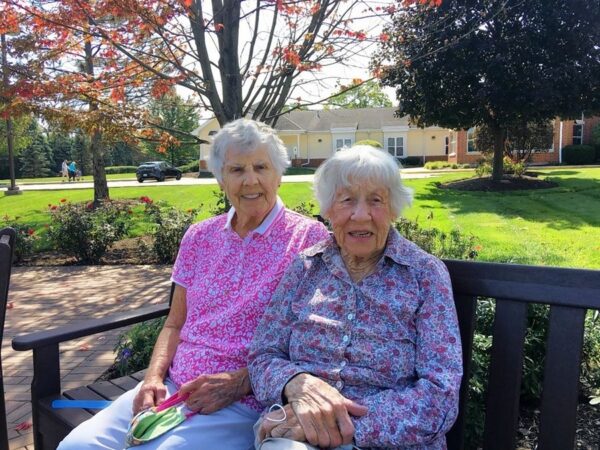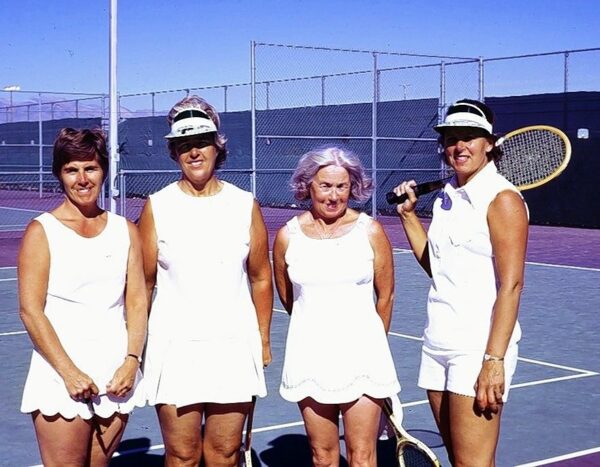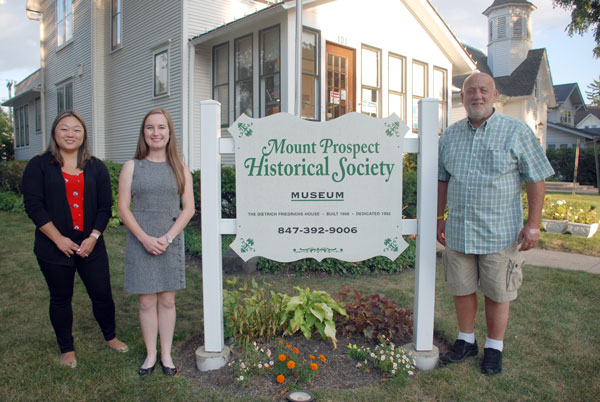
The McCarron Family during the Pandemic

By HS Board

By HS Board
Submitted by Terri Tangney Fleming
Posted 10/5/2020

Across the street was a field of tomatoes. On south Maple Street in 1955 Mount Prospect, there were two handsome brick farmhouses standing alone surrounded by farmland and promise.
The Chicago and Northwestern Railroad station was just a few blocks’ walk to the north. There was a new Catholic church and school just up the road. That tomato field was destined for a big town park. What better place to raise growing families?
That summer, Barb and Frank Tangney moved their three kids (and one on the way) out of Chicago’s Northwest Side to 404 S. Maple St., right next door to John and Marie Pope at 400 S. Maple.
The Popes had moved there a year earlier from Washington state. There was plenty of room in the new house for their own growing brood. In 1955, the Popes had five at home, and their sixth would come the following year.
Barb and Marie had a lot in common. Both devout Catholics, both can-do, self-reliant optimists with strong senses of right and wrong who believed in the powers of hard work and fresh air. Before marriage, Barb earned a degree in dietetics. Marie worked for Air Canada and moved from her native London, Ontario, to Chicago in 1946 to help open a branch office.
Every morning, the Tangney kids (eventually seven in all) and Pope kids — over the years joined by the Halas, Fisher and Mann kids as Maple Street filled in — would walk the five blocks to St. Raymond’s School.
After the kids were off, Barb often would sit in Marie’s kitchen for a cup of coffee or two. The two bargain hounds loved to shop together; coming home empty-handed was beside the point.
The families did nearly everything together. Once Lions Park was built, they swam there in summer and sledded (on Folgers Mountain) in the winter. The kids joined the Mount Prospect Speed Skating Club. Both families’ properties had an extra lot, which provided plenty of room to play endless games of kick the can, red rover, four square, baseball and a homegrown game they called ditch.
They watched Main Street Fourth of July parades as a group. The Tangneys had pear and apple trees. The Popes a big and fruitful mulberry tree.

Even if it meant bringing the baby buggy to the courts — which it often did — Barb and Marie were devoted tennis players and had a schedule of regular games at Lions Park with other like-minded moms.
Dressed in their tennis whites, their shouts from the court (nothing saltier than “Oh, Barbara!” or “Oh, Marie!”) could be heard around the neighborhood.
The two women started a women’s jogging club — even went so far as having sweatshirts made — but were less devoted to actually running.
As the rest of South Maple Street filled in, 400 and 404 became the sites of block-party traditions. A favorite was the annual corn roast in late summer, taking advantage of the bounty of local fresh corn. Corn would be soaked then roasted on an old bed spring laid over a bed of coals in the Popes’ yard. On the Tangney driveway was the keg of beer and every flavor of Arlington Beverage Co. soda pop on ice.
Years went by. The kids grew, left for college and started their own families. The best friends’ shared history grew deeper. The couples and their network of friends had time for excursions, such as weekends in Wisconsin to cross-country ski or snowmobile.
With fewer responsibilities at home, Barb Tangney turned to volunteering at Holy Family Hospital. Marie Pope worked in the office at the Mount Prospect Fire Department, learning to use a computer. Tennis together was a mainstay.
Grandkids came into the picture and provided much joy. As of September 2020, Barb has 15 grandkids and 11 great-grandkids, while Marie has 17 grandkids and seven great-grands.
Sadly, Frank, who retired in 1982 as treasurer of Putman Publishing Co., died at age 76 in 1996. John, who retired as a pharmaceutical rep from E.R. Squibb, died at 90 in 2008.
Soon after Frank’s passing, Barb downsized and moved into an apartment in Arlington Heights. Marie and John had moved to Prospect Heights in 2002.
The women stayed in close touch despite time and distance. If Barb was at her vacation home in Colorado or Marie visiting her kids, they stayed in touch the old-fashioned way: by letter.
When they were both home, they carpooled to St. Raymond’s 7:30 a.m. Sunday Mass then dined together at Le Peep Cafe.
Fast forward to 2020. Sharp-as-a-tack Marie — now 104 — resides in an independent living apartment in Wheeling’s Addolorata Villa senior living community. Barb, who until the pandemic hit was a YMCA water-aerobics regular, celebrated her 95th birthday in June.
She found herself ready to make a similar move. When asked where she’d like to go, Barb recalled that Marie and other friends were happy at “A.V.” Why not there?
Call it luck, call it divine providence or call it a reward for lives well-spent, but when Barb moved into her A.V. apartment on Sept. 19, there was Marie, right next door again, continuing a circle that started 65 years ago.
Their first day back together, they attended 3 p.m. Mass then walked down the hall for dinner in the cafeteria.
Copyright 2020 Daily Herald (www.dailyherald.com)
By HS Board
Mount Prospect is a caring and resilient community, a fact that has particularly come to the fore during this challenging time in human history.

So, the Mount Prospect Historical Society is introducing a timeless and inspirational t-shirt which proclaims “Mount Prospect Proud – Life is All About Peaks and Valleys” to tout our community’s strength and ability to endure difficult times of all kinds, while waiting for better days to return.
That t-shirt is now available through the Society’s website at mtphist.org. The shirts come in many sizes and begin at $25. There is also a discount for members. You can purchase it at this link here.

In addition, the Society has introduced four downloadable neighborhood walking tours to entertain those who are increasingly walking and bicycling through town and a website page which encourages resident and other associated with Mount Prospect to submit: essays, photos, videos, poems and so forth about their 2020 experiences. This solicitation effort is being done in partnership with the Mount Prospect Public Library and the Village of Mount Prospect.
By HS Board

The Mount Prospect Historical Society, the dynamic and growing organization which has taken pride in preserving the Village’s past since its founding during the nation’s Bicentennial in 1976, is excited to announce a trio of new employees, all of whom live within the Village.
Emily Dattilo who holds a bachelor’s degree in history and anthropology from Loyola University and a master’s degree in history from Marquette University, is the Society’s new director. Dattilo is a native of Mount Prospect who has always loved history and is excited to add to the public’s understanding of its community’s unique past. Previously she had worked as a museum educator at the Naper Settlement in Naperville and a collections assistant at the McHenry County Historical Society, following internships at the Chudnow Museum of Yesteryear in Milwaukee, the Milwaukee County Historical Society and the May Weber Ethnographic Collection at Loyola University.
“I’m thrilled to have the opportunity to care for and to share the history of my hometown,” Dattilo stated. “I look forward to sharing history with the community in new, engaging ways.”
Amanda Marcus has accepted the Office Manager position. She, too, is a lifelong resident of Mount Prospect. The mother of four has worked part-time in a variety of local office positions and is excited to now work for the Historical Society since she minored in history at the University of Illinois at Chicago while earning her degree in psychology.
Tom Groenwald, the resident of an historic home in the Village for over 35 years, has taken over the part-time bookkeeper position. He recently retired after a 42-year career in finance and accounting for a variety of firms, primarily in the senior healthcare realm and looks forward to sharing his extensive financial knowledge with a local organization.
“As the Society continues to expand its community outreach, we are so pleased to welcome new staff members who bring us a variety of talents, ideas, and experiences, all of which will enhance our programs, exhibits, and dissemination of history to local residents in fresh, new ways,” stated Deb Rittle, Society president.
The Society bid farewell in July to long-time Office Manager Cindy Bork who retired after 17 years on the job. Former director Lindsay Rice moved on to become Executive Director of the St. Charles History Museum just before the pandemic began and former bookkeeper Jane Winters has chosen to concentrate on her full-time position.
By HS Board

 The Mount Prospect Historical Society is pleased to be offering its 2nd virtual Summer History Camp – History of the Olympics: both ancient and modern – July 27-31, 2020.
The Mount Prospect Historical Society is pleased to be offering its 2nd virtual Summer History Camp – History of the Olympics: both ancient and modern – July 27-31, 2020.
This on-line, interactive, and hands-on History Camp runs Monday through Friday from 9 a.m. to noon and features activities, projects and virtual field trips. We welcome Campers ages 7 (as of April 1, 2020) to 12.
Olympics campers will receive access to an exclusive website created just for on-line history Campers, daily Zoom sessions with the Camp Director, the book Hour of the Olympics by Mary Pope Osborne, materials for all projects and a participation medal. Camp supplies will be picked up by each camper (non-contact) at the Society (101 S. Maple St., Mount Prospect) the week before camp starts. Bags labeled with each camper’s name will be in the breezeway between the Dolores Haugh Education Center and the Carriage House.
Cost is $50 per camper. Space is limited to 10 Campers, so register today so you don’t miss out on this fun opportunity! Reservations may be made through the Society’s website on our on-line registration form or by calling the Society at 847-392-9006.
Sincerely,
The Mount Prospect Historical Society Staff
By HS Board
submitted by Caitlyn Kviz, 6-19-2020
Explaining the Pandemic to my Past Self pt. 2, by Julie Nolke
https://www.youtube.com/watch?v=xdyDpP2s-og
Day 1 in quarantine vs. Day 50, by Trey Kennedy
https://www.youtube.com/watch?v=GCp2gZ-BMIw
Working from home be like . . ., by Trey Kennedy
https://www.youtube.com/watch?v=fidNWIsCxXI
By HS Board
by Caitlyn Kviz
6/10/2020
For my family, the Covid pandemic didn’t really start to have much of an effect on our daily lives until around the beginning of March. My brother and I were attending college up at UW Eau Claire, having an otherwise fairly normal semester. We didn’t have much on our minds other than the typical college kid stuff, like trying to get in our assignments on time and finishing up projects and big papers before midterms week. At the time, I worked two part time jobs, both involving working on stage crew for a local theater and the student center at the university.
The week of March 8 in particular stands out to me as the first time our daily lives began to be directly affected by this virus. As other schools in the UW system began to think about closing, our Chancellor’s Office sent out near-daily emails with updates on what the university was doing to control the risks associated with staying open. It all came to a head on the morning of Thursday, March 12, when our chancellor held a forum with local health officials that was live streamed across campus. I watched it on a projection screen in my painting class in the fine arts building.
Even while watching the forum, the mood in the room was happy and light. None of us really took the situation seriously at this point. Instead, we joked around and talked with our friends. I distinctly remember telling a friend, “The chancellor looks like he needs a nap. He’s like, what do yáll want now?” We laughed and kept painting, working on a big project that was due at the end of the week. I remember in a group chat with some kids from work, someone had made a March Madness-style bracket to try to predict which UW schools would close. Our university’s Facebook page for memes was full of stupid jokes about Covid, too.
At the end of the forum, he promised that a decision would be made by 5 pm. that day if the school was closing. Meanwhile, I moved on to my next class in typography and graphic design, and afterwards went back to my dorm room to drop off my stuff and eat dinner.
The decision, and many subsequent long emails, started rolling in at around 4 pm. that day. Our school was going to stop classes, and take essentially a three-week long spring break to allow time for our professors to figure things out. Then we would take classes online for two more weeks and make a decision on the rest of the semester based on how things were going at that point. Although we shouldn’t have been that surprised by it, the news hit me like a load of bricks. Things were getting real. I called my parents and younger brother to begin arranging an early ride home for the break. We finally decided on a bus ride home that Sunday afternoon, which was difficult to secure, because the website kept crashing from, you know, the whole UW system jumping on it at once. Afterwards, I called it a night.
On Friday, I woke up to even more crazy emails, this time from the theater in downtown Eau Claire that I work at as a stagehand. I quickly skimmed through it. So they’re closing too, and I’m laid off. WAIT, I’M LAID OFF? I read through it again. I am, in fact, laid off, news that I unexpectedly took very personally. I’ve worked there since the place was built and had its grand opening in 2018. It was like my little baby, in a way, a product of our blood, sweat, and tears. I watched it grow up. The job had provided me with so many great friends, and a steady income, among other things. I wondered if this was it, and if I’d ever run into these people again. At that moment, I was overwhelmed. I rolled over and cried myself back to sleep.
The weekend went by in a blur. After many event cancellations, I was left with only one weekend shift for my student center job, helping to close things up. The production office was empty except for me. And before I knew it, my butt was on a bus going back home to Illinois. After I got home, my feelings changed rapidly, from being happy about being on spring break, to more like, what the heck do I do now? Out of all my classes, only one had a real online meetup time, which I looked forward to, for my only real source of human interaction besides my family. Otherwise, my online classes just added to my feelings of isolation and loneliness.
To add to the sense of aimlessness surrounding our daily lives, my summer job was continually pushed back throughout the spring and then cancelled a few weeks ago. Me and my brother both got jobs at the BSA’s Philmont Scout Ranch in New Mexico, which we were really looking forward to. After talking about it, we both decided to resign a few weeks before it was officially cancelled, due to our own worries regarding traveling such a long distance during a pandemic. Still, it feels like it’s two different things to decide not to do something, vs. being unable to even if you wanted because it’s cancelled. It really takes the fun out of things. We’ve tried to find summer jobs afterwards, but by then it was too late to be hired for something we were really interested in. The only places that seem to be hiring are grocery stores, which we turned down due to the personal health risk of interacting with so many people daily.
And from there, the days blurred into weeks, which blurred into months, like fruit in a blender. You’d think it’d be more exciting to live through such a crazy historic event, but yet, this is quite possibly the most bored I’ve been in my life so far. It’s like our standard summer vacation boredom but on steroids. We can’t go anywhere or do anything without wearing a mask, sometimes gloves, and in some places they take your temperature at the door. There are stickers on the floor everywhere to mark where to stand to follow the CDC-recommended six feet apart from other people. In some stores, arrows are marked on the floor so that shoppers can only go one way, to minimize contact. Going out in general has a much different feel to it than it did before the virus. In grocery stores, people don’t wander around, and read nutrition labels, and talk to each other anymore. Hardly anyone goes shopping for fun or because they’re bored. Instead, grocery shopping has been reduced to a get-in and get-out type of procedure.
You might wonder what we’re doing with all of our sudden free time. I wonder about this too. My days since the quarantine started have been an unpredictable mix of getting tons of random things done to spending almost the whole day either sleeping or on some sort of social media.
I’m pretty sure I’ve watched almost the entirety of the videos available on Youtube, for example. Heck, I even started an artsy Instagram for fun. I miss human interaction. We’ve started taking care of all our projects around the house that used to be at the rock bottom of our to-do lists. We replaced our basement stairs from like the 60s with some nice wooden stair treads. We painted the kitchen. It was a rager.
As I’ve mentioned before, humor and sarcasm are one of the main coping strategies my family has been using to keep our emotional and mental health in check. When we first got home from school, we used an advertisement for Target’s 14 Days of Beauty sale as a way to keep track of how many days had passed. By April, I started designing my own funny calendars using software I’d learned in college. Your tuition dollars hard at work, as my one professor likes to say. April’s theme was coronavirus memes I’d found online. May’s theme was Sea Cucumber Fun Facts, inspired by my parents calling us a sea cucumber for working on schoolwork in our beds. Similarly, June’s theme was Swear Words in Foreign Languages, reflecting everyone’s frustration and stir-craziness from staying home for so long. Hey, man, you gotta do what you gotta do.
The numbers of both people infected and deaths are still rising, but our government is still going forward with their plan to reopen the state. The reopening has unexpectedly become a very politicized, controversial issue. Some people argue that we’re going to kill the economy by staying closed for so long, so they want to reopen, and others would rather stay closed to minimize the human impact. All of the confusion in government leadership has resulted in a feeling that the ‘goalposts’ or light at the end of the tunnel, are constantly being moved. Our individual actions to control the spread are overridden by morons partying on the beach in the hundreds, for example. This is perhaps the most frustrating part of this whole thing. Instead of being able to control our own lives, like planning trips for months down the line, for example, we are at the mercy of both the virus and our government’s actions.
If I were to give advice to future generations based on my experiences, I would say that it’s important to follow all health guidelines recommended by your state or country right away and without pushback to minimize the risk of a virus like this spreading again. Similarly, I encourage you to demand quick action from your government if they aren’t taking any measures to slow the spread. It’s absolutely heartbreaking to see those graphs online that show that so many lives would have been saved if our current regulations went into effect even a week earlier that they did. Lastly, this pandemic, like so many other things in life, has proven that knowledge and education is power. It’s important to stay informed about the virus by reading the news, scientific journals, and other reputable sources, so that you can better recognize the symptoms and next steps needed to get help if you start to feel sick. By taking personal responsibility for the wellness of you and your family, we can help to avoid the spread of future diseases.
By HS Board
Mount Prospect Historical Society
101 South Maple Street
Mount Prospect, IL 60056
847.392.9006
info@mtphistory.org
The Mount Prospect Historical Society is a 501(c)(3) nonprofit organization that is committed to preserving the history of Mount Prospect, IL, through artifacts, photographs and both oral and written memories of current and former residents and businesspeople. On its campus in the heart of the Village, the Society maintains the 1906 Dietrich Friedrichs house museum, the ADA-accessible Dolores Haugh Education Center and the 1896 one-room Central School, which was moved to the museum campus in 2008, renovated and opened to the public in 2017, the 100-year anniversary of the Village.